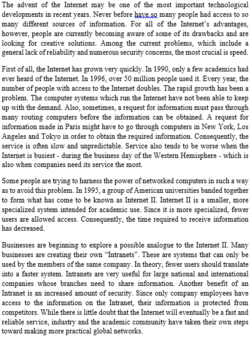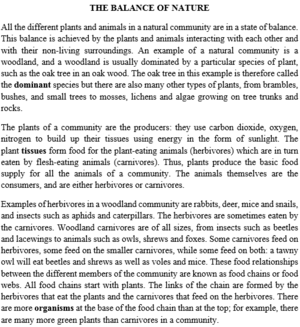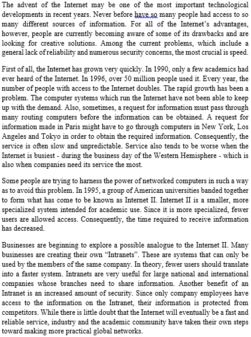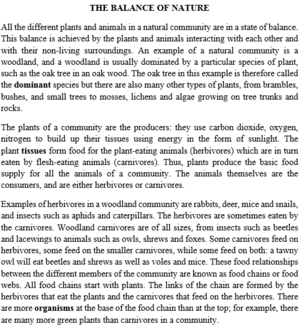Read the following passage and mark the letter A, B, C, or D to indicate the correct answer to each of the questions.
I didn’t even notice him. It was a chilly November evening in New York City, and my daughter and I were walking up Broadway. I was thinking, “Milk, dry cleaners, home”. Was I supposed to notice a guy sitting inside a cardboard box next to a newsstand? No, but Nora did. She wasn't even four, but she pulled at my coat sleeve and said. “That man’s cold, Daddy. Can we take him home?"
don't remember my reply - probably something like, “That wouldn't really be helping him”. Maybe I made her feel better by giving her an apple. I don't know. But I do remember a sudden heavy feeling inside me. I had always been delighted at how much my daughter noticed in her world, whether it was birds in flight or children playing. But now she was noticing suffering and poverty.
A few days later, I saw an article in the newspaper about volunteers who delivered meals to elderly people. The volunteers went to a nearby school on a Sunday morning, picked up a food package, and delivered it to an elderly person. It was quick and easy. I signed us up. Nora was excited about it. She could understand the importance of food, so she could easily see how valuable our job was. When Sunday came, she was ready, but I had to push myself to leave the house. On the way to the school. I fought an urge to turn back. The Sunday paper and my coffee were waiting at home. Why do this? Still, we picked up the package and phoned the elderly person we'd been assigned. She invited us right over. And that day Nora and I paid a visit to her depressing flat. After saying goodbye, I walked home in tears.
Professionals call such a visit a “volunteer opportunity". Indeed, the proverty my daughter and I helped lessen that Sunday afternoon was not the old woman's alone it was in our lives, too. Nora and I regularly serve meals to needy people and collect clothes lor the homeless. Yet, as I've watched her grow over these past four years. I still wonder which of us has benefited more?Read the following passage and mark the letter A, B, C, or D to indicate the correct answer to each of the questions.
I didn’t even notice him. It was a chilly November evening in New York City, and my daughter and I were walking up Broadway. I was thinking, “Milk, dry cleaners, home”. Was I supposed to notice a guy sitting inside a cardboard box next to a newsstand? No, but Nora did. She wasn't even four, but she pulled at my coat sleeve and said. “That man’s cold, Daddy. Can we take him home?"
don't remember my reply - probably something like, “That wouldn't really be helping him”. Maybe I made her feel better by giving her an apple. I don't know. But I do remember a sudden heavy feeling inside me. I had always been delighted at how much my daughter noticed in her world, whether it was birds in flight or children playing. But now she was noticing suffering and poverty.
A few days later, I saw an article in the newspaper about volunteers who delivered meals to elderly people. The volunteers went to a nearby school on a Sunday morning, picked up a food package, and delivered it to an elderly person. It was quick and easy. I signed us up. Nora was excited about it. She could understand the importance of food, so she could easily see how valuable our job was. When Sunday came, she was ready, but I had to push myself to leave the house. On the way to the school. I fought an urge to turn back. The Sunday paper and my coffee were waiting at home. Why do this? Still, we picked up the package and phoned the elderly person we'd been assigned. She invited us right over. And that day Nora and I paid a visit to her depressing flat. After saying goodbye, I walked home in tears.
Professionals call such a visit a “volunteer opportunity". Indeed, the proverty my daughter and I helped lessen that Sunday afternoon was not the old woman's alone it was in our lives, too. Nora and I regularly serve meals to needy people and collect clothes lor the homeless. Yet, as I've watched her grow over these past four years. I still wonder which of us has benefited more?
1. the word "depressing" in the passage is closest in meaning to .........
A. in poor condition B. in good condition
C.big D. small
2. how did the following can be the best title of the passage?
A. he felt relaxted B. he felt sorry for her
C. he felt happy D. he felt disappointed
3. which of the following can be the best title of the passage?
A. a lesson in caring
B. volunteer opportunities
C. an international voluntary organisation
D. a beautiful sunday
4. the phrase " delighted at" in the passage is closest in meaning to .......
A. very bored with B. very pleased at
C. very disappointed with D. very surprised at







Đáp án D
Mạng xã hội Facebook phát triển ở trường Havord ________.
A. là một dự án hợp tác với các sinh viên khác
B. không thể tiếp cận bởi sinh viên trường Havard
C. đã trở thành một công việc toàn thời gian của Mark sau khi học xong Đại học
D. đã trở nên thực sự thành công sau tháng 6 năm 2004
Căn cử vào thông tin trong câu sau: "By the end of 2004, Facebook had one million users and Mark was climbing high.” (Vào cuối năm 2004, Facebook đã có một triệu người sử dụng và Mark đang trên đà thành công.)